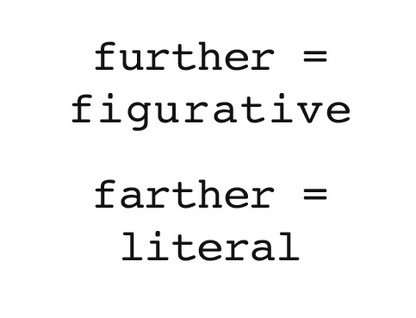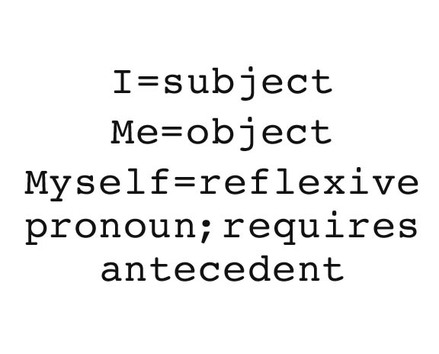Recently I was approached by a co-worker who was struggling with the further/farther conundrum. But this riddle isn't so complex if you use an easy memory tool.
Further is used in a figurative sense.
Farther refers to literal distance (1).
I always think of walking a FAR distance; this helps me to think of the LITERAL distance and relate it to a LITERAL meaning.
Examples:
The police spokesman said the matter required further investigation. (figurative)
Michael and I decided to walk even farther into the woods. (literal distance)
Even though this recommended usage of further and farther seems to be the prevailing choice today, according to Merriam-Webster Online, historically the words were used interchangeably and have only in recent years taken on distinct meanings (2). The Online Etymology Dictionary states: "There is no historical basis for the notion that farther is of physical distance and further of degree or quality (3)." The usage I support and promote in this post is the usage I've known throughout my working life in the newspaper business, and, for now, is the preferred choice of the Associated Press Style Manual (1) as well as noted grammar pundits (4) (5).
It is also worth noting that in some instances it's difficult to distinguish whether the intended usage is literal or figurative. In cases where the meaning is ambiguous, it's commonly accepted that either word is appropriate.
That's it. We've made it one step further (farther?) down the road to better writing habits. (Since it's somewhat ambiguous and really more of a figurative meaning, I'm going with further.)
Did you find this post helpful? Do you have a memory aid for further/father that you'd like to share? Have a question you'd like to submit to the blog? Please leave your thoughts in the Comments below or submit a question through the link in the sidebar.
SOURCES
1. "Farther, further." AP Stylebook Online, 2012. http://www.apstylebook.com (accessed Sept. 24, 2012; subscription required).
2. “Farther.” Merriam-Webster Online, 2012. http://www.merriam-webster.com (accessed Sept. 28, 2012).
3. “Farther.” Online Etymology Dictionary, 2012. http://www.etymonline.com (accessed Sept. 30, 2012).
4. "Further versus farther." http://grammar.quickanddirtytips.com/further-versus-farther.aspx (accessed Sept. 29, 2012).
5. "Farther, further: What's the difference?" http://www.dailywritingtips.com/farther-further-whats-the-difference (accessed Sept. 29, 2012).
Further is used in a figurative sense.
Farther refers to literal distance (1).
I always think of walking a FAR distance; this helps me to think of the LITERAL distance and relate it to a LITERAL meaning.
Examples:
The police spokesman said the matter required further investigation. (figurative)
Michael and I decided to walk even farther into the woods. (literal distance)
Even though this recommended usage of further and farther seems to be the prevailing choice today, according to Merriam-Webster Online, historically the words were used interchangeably and have only in recent years taken on distinct meanings (2). The Online Etymology Dictionary states: "There is no historical basis for the notion that farther is of physical distance and further of degree or quality (3)." The usage I support and promote in this post is the usage I've known throughout my working life in the newspaper business, and, for now, is the preferred choice of the Associated Press Style Manual (1) as well as noted grammar pundits (4) (5).
It is also worth noting that in some instances it's difficult to distinguish whether the intended usage is literal or figurative. In cases where the meaning is ambiguous, it's commonly accepted that either word is appropriate.
That's it. We've made it one step further (farther?) down the road to better writing habits. (Since it's somewhat ambiguous and really more of a figurative meaning, I'm going with further.)
Did you find this post helpful? Do you have a memory aid for further/father that you'd like to share? Have a question you'd like to submit to the blog? Please leave your thoughts in the Comments below or submit a question through the link in the sidebar.
SOURCES
1. "Farther, further." AP Stylebook Online, 2012. http://www.apstylebook.com (accessed Sept. 24, 2012; subscription required).
2. “Farther.” Merriam-Webster Online, 2012. http://www.merriam-webster.com (accessed Sept. 28, 2012).
3. “Farther.” Online Etymology Dictionary, 2012. http://www.etymonline.com (accessed Sept. 30, 2012).
4. "Further versus farther." http://grammar.quickanddirtytips.com/further-versus-farther.aspx (accessed Sept. 29, 2012).
5. "Farther, further: What's the difference?" http://www.dailywritingtips.com/farther-further-whats-the-difference (accessed Sept. 29, 2012).



